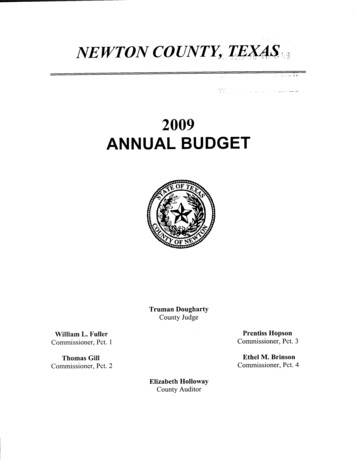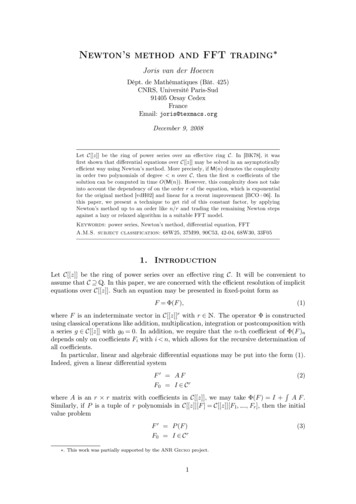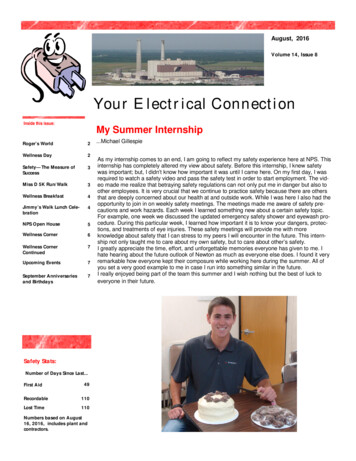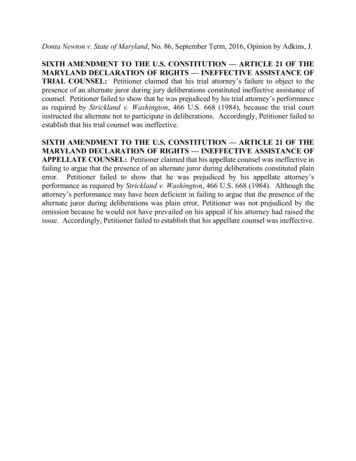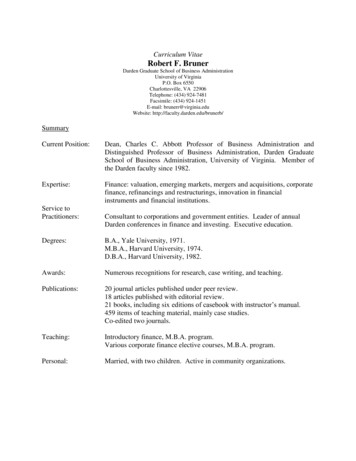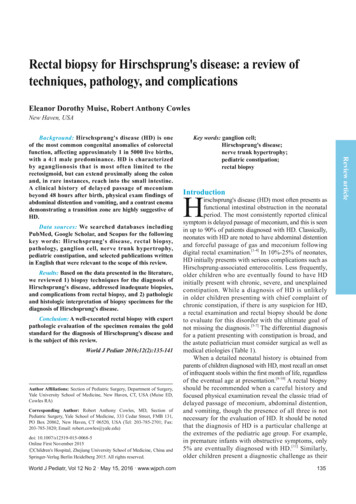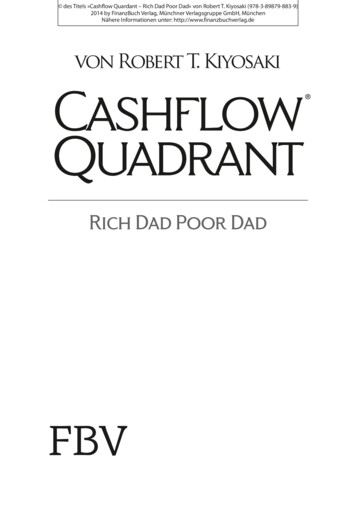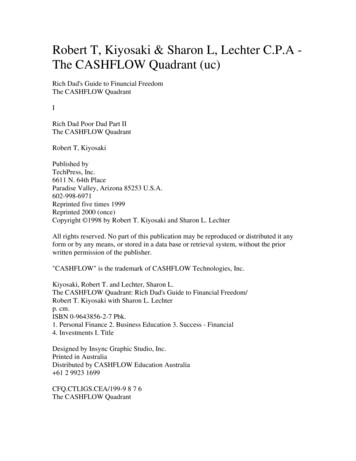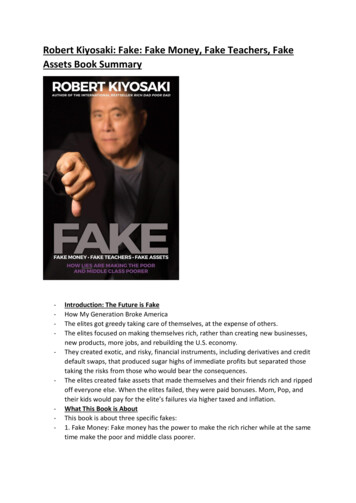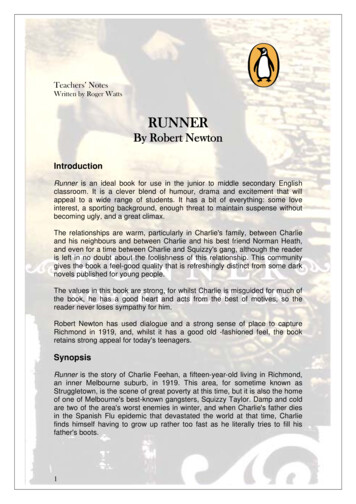
Transcription
Teachers’ NotesWritten by Roger WattsRUNNERBy Robert NewtonIntroductionRunner is an ideal book for use in the junior to middle secondary Englishclassroom. It is a clever blend of humour, drama and excitement that willappeal to a wide range of students. It has a bit of everything: some loveinterest, a sporting background, enough threat to maintain suspense withoutbecoming ugly, and a great climax.The relationships are warm, particularly in Charlie's family, between Charlieand his neighbours and between Charlie and his best friend Norman Heath,and even for a time between Charlie and Squizzy's gang, although the readeris left in no doubt about the foolishness of this relationship. This communitygives the book a feel-good quality that is refreshingly distinct from some darknovels published for young people.The values in this book are strong, for whilst Charlie is misguided for much ofthe book, he has a good heart and acts from the best of motives, so thereader never loses sympathy for him.Robert Newton has used dialogue and a strong sense of place to captureRichmond in 1919, and, whilst it has a good old -fashioned feel, the bookretains strong appeal for today's teenagers.SynopsisRunner is the story of Charlie Feehan, a fifteen-year-old living in Richmond,an inner Melbourne suburb, in 1919. This area, for sometime known asStruggletown, is the scene of great poverty at this time, but it is also the homeof one of Melbourne's best-known gangsters, Squizzy Taylor. Damp and coldare two of the area's worst enemies in winter, and when Charlie's father diesin the Spanish Flu epidemic that devastated the world at that time, Charliefinds himself having to grow up rather too fast as he literally tries to fill hisfather's boots.1
With a young brother, Jack, still at the breast, Charlie does his best to fend forhis family. He runs through the Richmond streets to keep warm and he turnsthis ability to good use when he leaves school without his mother's knowledgeand works as a runner for Squizzy. To get the job he has to compete in afootrace against a number of other boys. In unexpectedly winning the race hemakes an enemy of Barlow and forms a good friendship with Norman"Nostrils" Heath, who turns out to be a star footballer.For a while, the gangster fulfils a role as a substitute father, and Charlie findshimself intoxicated by the power that is attached to Squizzy's name. WhenCharlie's Ma becomes the object of the unwanted attentions of Mr Peacock,who minds the wood yard, Charlie realises that the 'free' firewood is availableat a price that becomes too high when the man turns violent with his mother.Leaping to her defence, Charlie lays him out with his cricket bat and becomeseven more dependent on Squizzy to keep out of trouble. With the assistanceof his good friend, Nostrils, Charlie takes on a series of night time illegal liquorruns for Squizzy that draw him even closer into the Melbourne underworld.It is when he is watching his friend play football that Charlie first becomesattracted to Alice. This game intensifies the rivalry with Barlow on the footballfield when Nostrils outplays him and, later, Charlie finds him pursuing Alice.Rivalry is developing in other ways too and Squizzy is intensifying hiscompetition with Snowy Cutmore in Fitzroy. Gradually Charlie begins to seethe ugly side of working for Squizzy, when he has to collect money fromAlice's father. Unable to complete the job, he substitutes his own money. Thiswill later turn out to be the beginning of his relationship with Alice, but it alsoincurs Squizzy's wrath.Seeing the need to look after himself better, Charlie begins training as a boxerwith his next-door neighbour, Cecil Redmond. When this doesn't work out hefinds his true vocation as a runner and gets ready for the Ballarat Mile footrace.However, avoiding Barlow becomes increasingly difficult and during one ofSquizzy's late night jobs, Barlow's gang waylays Charlie and Nostrils. In acritical moment Nostrils slips and is caught, whilst Charlie is able to escape,but is tormented by having to watch the gang cruelly beat up his friend.Visiting Norman in hospital, Charlie discovers what a true friend he really has.Finally, with the aid of Mr. Redmond, Charlie makes it to Ballarat, where hecompetes in the race and gambles all in the hope of providing financialsecurity for his family.2
CharactersCharlie FeehanThe central character, Charlie Feehan, is a gutsy young fellow who findshimself growing up just a little too fast when his father dies. ‘When theundertakers came to wheel my father's lifeless body out to the hearse, it wasas if they took my childhood with them’ (p.28). His father had been ‘a talker, achewer of ears. Whenever there was company around he was at his best’(p.38) and Charlie has inherited a fair amount of his father's ability, even if hisimagination and his tongue can outrun his ability, as he finds out when heplays football with Nostrils (p.41) or brags of his boxing training (p.88). The artof ‘finkin and footwork’ (p.83) is what he will need to carry him through thesedifficult times.It is a challenge just to find enough food to put on the table and to keep thehouse warm, and so Charlie helps out by rabbiting in Yarra Park andcollecting firewood scraps from the Fitzroy wood yard. At night he runs tokeep warm. He ‘took to the streets like a drunk takes to the bottle’ (p.3). Hehas very little interest in school, so when he gets the opportunity to try out fora job with Squizzy Taylor he puts his running skill to good use. This raceshows his determination, a quality that Squizzy was quick to recognize andsupport, but there is a fair amount of naivety that goes with it that is a risk forCharlie.Family always comes first for Charlie, and the reader admires the way hesupports his mother and young brother, even if it means lying to them aboutworking for Squizzy. Charlie has to grow up fast when he sees how Peacocktakes advantage of his mother. ‘That night (he) turned sixteen years old’(p.68). Initially, he is ashamed when he first sees them together, but he soonleaps to her defence when Peacock attacks her. This brings him closer toSquizzy for a while, who perhaps he sees as something of a father figure. Fora while he becomes distant from his mother during the period of her illness, ashe finds it difficult to negotiate her neurotic behaviour. Things don't stay likethis for long, as Charlie goes about the business of growing up and closingthe gap between imagination and reality.Norman HeathNicknamed Nostrils because of his big nose, Norman is the friend Charlieneeds. There is an immediate respect and attraction between the boys. WhenCharlie is tired of well-meaning neighbours, Nostrils is ‘something fresh’(p.19). During the course of the book he will teach Charlie the meaning offriendship. He is an honest voice, able to see through Charlie's illusions. He isloyal and has a great sense of humour. Even though their relationship is builtupon a lie, as Charlie ‘didn't have the heart to tell him that it should have beenhim on Squizzy Taylor's payroll’ (p.20), their friendship will survive evengreater challenges.When they first meet up with the Barlow Boys in Barkly Gardens and take totheir heels, ‘Nostrils did something (Charlie) will never forget. He waited’.3
The scene is a precursor of the one in Fitzroy Gardens when Barlow kneecaps Nostrils. During this second incident, Charlie's ‘limbs refused to budge.and it was shame that paralysed’ him. Despite this and the terrible painNostrils is in, his first words are for Charlie, and he even manages to keep hissense of humour: ‘Don't worry .Charlie .I showed 'em. a thing. or two.’Nostril's fate will bring about Charlie's self-knowledge and provide inspirationfor Charlie in the race. ‘A dose of Norman Heath - there was no bettermedicine for raising one's spirits’ (p.166).Cecil Redmond‘In the seedy streets of Richmond, you would not find two finer neighboursthan the Redmonds’ (p.1). Cecil can always be found looking at the sky readyto pass on a few well chosen comments about the weather. Beyond this, hisgreat love was the Richmond Football Club. When Charlie struggles to be the‘man a the 'ouse,’ Mr. Redmond is there to offer boxing training, although itdoesn't turn out to be quite what Charlie expected, and when it fails to live upto Charlie's grandiose daydreams, he is there to offer more unconventionaladvice on running training for the Ballarat Mile Race.It seems that Charlie's close acquaintances may live in the slums, but theyhave big hearts and big imaginations, so it comes as no surprise when thereader discovers that Cecil's ‘bit o' runnin' was from the school bully and he isnot quite the experienced trainer Charlie thought him to be.Squizzy TaylorMen like Squizzy loom large in the history of places like Richmond and it iseasy to form too pleasant an impression of them. For a while Charlie is takenin. When he first meets the gangster Charlie ‘found him not in the least bitunsightly. However on the canvas, he looked like a weasel, cunning andbeady eyed’ (p.9).Charlie admires him, and this opinion is improved when Squizzy fixes the raceso Charlie wins. He ‘was one of them’ (p17). Squizzy can fix Charlie'sabsence from school, and fix up Mr Peacock, but as the rivalry with Fitzroygang leader, Snowy Cutmore intensifies Squizzy's other side emerges. He isfrequently drunk, short tempered and vindictive. ‘Suddenly, as quick assomeone flicking a switch, Squizzy turned nasty’ (p.168), and very nearlyshoots Charlie in anger.Charlie is released and is now able to run for himself, not for Squizzy.4
SettingThe novel is located in Richmond and Fitzroy, working class inner citysuburbs of Melbourne, as Charlie runs errands for Squizzy.‘The streets of Richmond were like the pages in a book. They told astory.This story was full of hardship’. Newton captures the mood of thestrugglers who live there with their colloquial language, and he captures thesensations of living in an industrial area,".On one particular day (Nostrils)detected seventeen different stenches in the air’. The children played in ‘aplayground full of blood and guts, of horse manure, empty tins and rats’.Scenes are played out in the book in streets that are recognisable today.But life is not without its simple pleasures: a hot bath, a warm fire, or a danceto the only record played on a borrowed gramophone.ThemesGriefCharlie's Dad is with him throughout this story. He is there in the holey bootsCharlie runs in, and despite wearing Squizzy's new replacements for a while,when Charlie really grows up he goes back to wearing the boots he couldnever bring himself to throw away. Charlie often recalls his father's advice,e.g. about the true test of character (p.110) and to find himself a girl who candance (p.127).After his father's death, Charlie ‘got so confused sometimes (he) didn't knowwho it was (he) was supposed to be’ (p. 28).He really hasn't had time to grieve as he has been so busy growing up andtrying to support his mother, and he hasn't really been able to talk about hisfather's death despite the many well-wishers who would help him, onlyNostrils comes close to doing so (p.40).FriendshipThere are several critical moments in Charlie's friendship with Nostrils whenCharlie's behaviour is put under the spotlight. Their friendship began with a lieand is brought to crisis point when Charlie leaves Nostrils to be beaten up byBarlow. It is not until after the race that the debt is repaid.ChanceThere are a number of crucial moments when things hang in the balance forCharlie, e.g. When Nostrils slips running away from Barlow (p.147), and whenSquizzy nearly shoots Charlie when the boy quits (p.169).HumourCharlie's voice brings the book to life, particularly when he indulges his flightsof fantasy, or in his relationship with the duck. What he believed to be aHarriet turns out to be a Harry, so no luck with the egg laying, but the birdalways seems to have one over on him until Charlie, the expert boxer,indulges in a contest with the bird.5
‘.a bad tempered ball of feathers jumped from his pen and craned his headhigh.Struth!Quickly I raised myself up to match him and shouted.“I'm warning ya, Harry. Don't even think about it. How was I ta know you werea boy?”’ (p. 124)Student ActivitiesPlotting the events of the StoryFind a map of Richmond.As you read the story plot Charlie's runs on the map. Read p.11-15 - the description of the race. Read p.140-145 - the liquor run.Maps may be found at http://www.street-directory.com.au/aus new/index.cgior 6Produce a poster that tells the story of Runner.Using a Street Directory, sketch out the main streets betweenRichmond, the City and Fitzroy.As you read the book, mark in the places of importance.
My father's boots.We first see Charlie's boots when he turns up to race for Squizzy (p.6-8). How are the boots used in this story to tell us about Charlie's state ofmind? Find the times when he changes shoes. What is significant about thesechanges? see p.46 when Dolly offers new boots. see p.188 when Cecil gives him the running spikes. Why does Charlie run barefoot? (p.198)‘Are you big enough to fill your father’s boots?’ What does this expression mean in common use? Write a description of a father figure in your life, in which you outlinethe qualities you admire and which you would like to possess?Sparring with the DuckConsider Charlie's relationship with the duck Harriet/Harry. See p.32, 39, 124,and 156. What do these scenes add to the enjoyment of the book?Saturday NightRead the description of Saturday night - such simple pleasures! See p.34 How have things changed today? Write a descriptive piece about Saturday night.Writing DialogueDialogue contributes a great deal to the atmosphere of this book.Look at the way Newton writes conversation in this book. Read p.109-110.‘With the transaction complete, Barlow took the pies and stepped towards thedoor.“By the way,” he said. “If ya change yer mind 'bout goin' to the flicks, ya knowwhere ta find me.”After the door closed, Alice dropped the coins into the register.“Thanks fer that,” I said. “I take it yer not all that keen on Jimmy Barlow.”“He's a tosser. He thinks he can push people round just because he's done abit a boxin'.”“Ya don't like boxin'?”“I hate it.”’ Discuss with your teacher the techniques Robert Newton uses tocapture the sound of speech in this community at this time.Note the use of: He said/she said - or lack of it! How does this affect the reader? How is it clear who is talking? Slang Abbreviations - how is punctuation used to show missing letters?7
Try telling a simple story using mainly dialogue and without using lotsof "he/she said."Experiment with dialects to differentiate between speakers.Relationship with SquizzyPlot Charlie's relationship with Squizzy. You might use a flow chart to showthis diagrammatically.A flow-charting software program can be used, or you may draw your diagramfreehand.Squizzy TaylorHelps Charlie1.2.Charlie feels.Charlie works for Squizzy1.2.Charlie feels.and so on.Use your own design.8
The Cecil Redmond Coaching AcademyRead about Charlie's attempts to learn boxing and to train as a runner withCecil.Cecil's System could be described like this:Step 1 Skipping - to the accompaniment of nursery rhymesStep 2 Finkin' and footworkStep 3 Have dog - chase rabbit - chase dog What do you think about Cecil's coaching methods?Discuss with your teacher effective ways to write an instructional text.Research an activity in which you have some expertise.Give instructions to the class in how to effectively and safely increaseperformance in this activity.Either write a brochure, or give a talk, or use a PowerPointpresentation.ChoicesThere are times when Charlie makes critical decisions. These are ‘momentsthat define who you are’ (p.146). As he does so, time in the novel seems tostand still.‘Heads or Tails.Yes or no.Stay or go.’ (p.147 and p.169) Read p.146-152 and p.168-170What do these choices reveal about Charlie?Do they show different sides of his character?Has Charlie changed in the time between these two decisions?If so how?Is Charlie too hard on himself in relation to his first decision?Could he have done anything different?Is Charlie remarkably brave or silly in relation to his second decision?Justify your answers.Creative WritingThink about a time you made an important choice, one you might haveregretted, or one you were pleased about. Tell the story in a way thathighlights the importance of the choice.Mrs FeehanRead p.77-79. What is wrong with Mrs. Feehan after the fight with Peacock?‘The bruises, after all, would heal. It was something else - something that noamount of white powder could fix.9
Ma had lost her smile.’ (p.78)Ma's behaviour has changed quite dramatically, and it is several monthsbefore she gets better. The Redmonds refer to it as ‘a condition’ (p.80), somepeople might call it a "breakdown".This often happens when people have experienced a threatening event. Inschool, bullying can bring this about.Today it is more likely to be called an “adjustment disorder", or if it is moresevere "obsessive compulsive disorder", or "post traumatic stress disorder". Use a medical encyclopaedia or the Internet to find out about thesedisorders.Some sites to help are:http://www.medicalglossary.org/mental disorders neurotic disorders d.htmFurther ReadingBlood Ties by Rosemary HayesFlash Jack by Maureen McCarthyGoing Off by Colin BowlesJohnny Hart's Heroes by Dave MetzenthenCamel Rider by Prue MasonGaz series by Warren FlynnGoat Boy by Peter McFarlaneMao's Last Dancer, Young Readers Edition by Li Cunxin (non-fiction)Struggletown by Janet McCalman (non-fiction)10
playground full of blood and guts, of horse manure, empty tins and rats’. Scenes are played out in the book in streets that are recognisable today. But life is not without its simple pleasures: a hot bath, a warm fire, or a dance to the only record played on a borrowed gramophone. Them

